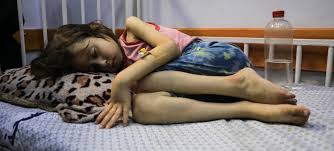Famine in Gaza

- 28 Aug 2025
In News:
The United Nations has confirmed a famine in Gaza City and surrounding areas, describing it as a “failure of humanity” and a man-made disaster. The declaration follows a report by the Integrated Food Security Phase Classification (IPC), which raised food insecurity in parts of Gaza to Phase 5, the highest level, indicating catastrophic conditions of starvation, destitution, and death.
Scale of the Crisis
- Population affected: Nearly 641,000 people are facing IPC Phase 5 conditions, while 1.14 million (58% of Gaza’s population) are projected to experience emergency-level food insecurity (IPC Phase 4) between mid-August and end of September.
- Children at risk: By June 2026, 132,000 children under five may face life-threatening malnutrition.
- Mortality: Gaza’s Hamas-run health ministry reports 271 deaths due to malnutrition, including 112 children.
- Historical Context: Since 2004, IPC has officially classified only four famines, with the last one in Sudan, 2024.
Causes
The famine is described as “starvation by design” by UN officials:
- Aid Restrictions: Israel has been accused of systematically obstructing humanitarian aid. The UN estimates 600 aid trucks per day are needed, but only 300 trucks are entering daily.
- Conflict Impact: Israel launched a military campaign in response to the Hamas attack on southern Israel in October 2023, leading to mass casualties and displacement. Over 62,000 deaths have been reported in Gaza, with more than 90% of homes damaged or destroyed.
- Infrastructure Collapse: Healthcare, water, sanitation, and hygiene systems have collapsed, exacerbating malnutrition and disease.
International Response
- UN Officials:
- Secretary-General Antonio Guterres called the famine a “moral indictment” and a man-made disaster.
- UNRWA Chief Philippe Lazzarini termed it “starvation by design”.
- UN Human Rights Chief Volker Turk attributed the famine to Israel’s unlawful restriction of aid.
- Global Condemnation:
- UK Foreign Secretary David Lammy described it as a “moral outrage”.
- Humanitarian groups and UN bodies have called for an immediate, at-scale response to prevent widespread starvation.
- Israeli Position: Israel denies a policy of starvation, claiming it has allowed 2 million tons of aid since the conflict began and continues to organize humanitarian corridors and airdrops, though the UN calls these efforts insufficient and sometimes unsafe.
